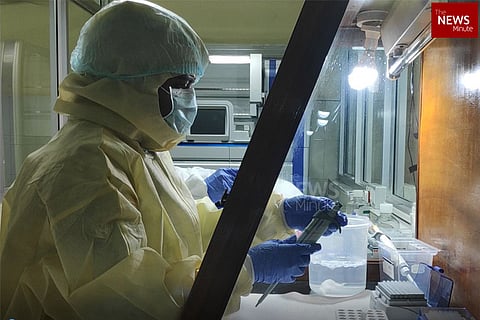

A year after a major outbreak of the Kyasanur Forest Disease (KFD) or ‘monkey fever’ which took the lives of at least 15 people, health officials in Karnataka’s Shivamogga district stated that there were four deaths linked to the disease this year.
KFD is a viral disease and can infect humans via sick or (recently) infected monkeys. However, the virus doesn’t transmit from person to person. The symptoms include a sudden onset of high-grade fever, nausea, vomiting, diarrhoea as well as haemorrhagic (bleeding) tendencies.
KFD recurs annually in the months between November and May, and with just one month of the cycle left, health officials expressed confidence that the number of cases this year will not reach 445, the cases reported in the 2018-19 cycle.
Dr Kiran SK, Director of the Virus Diagnostic Laboratory (VDL) in Shivamogga, confirmed that more samples were tested for KFD in the first three months of 2020 than in the entire year in 2019. 5213 samples were tested since January this year out of which 203 were positive. 146 positive cases are from Shivamogga while 47 are from Uttara Kannada and 10 are from Chikkamagaluru district.
Last year, 4824 samples were tested in the entire year and up to April 13 in 2019 only 2832 samples were tested.The outbreak began as early as in November 2018 in Aralagodu village of Shivamogga.
.jpg?w=640&auto=format%2Ccompress)
VDL has maintained records of ticks and monkeys found positive for the virus going back to 1959
The Karnataka Health Department admitted that there were lapses in managing the outbreak of the disease last year. Protocol was not followed in vaccinating residents in a 10 km radius when a suspected case of KFD was found in Aralagodu. Subsequently, an outbreak of the disease occurred in Brahmana Ilakale, 8.6 km from Aralagodu.
Health officials in Shivamogga recognised the importance of vaccination drives and began going door-to-door to vaccinate residents as early as July in 2019. “The schedule was changed in our preparedness for this cycle and we began vaccination drives as early as July. Even though it was still the monsoon season, we ensured that door to door vaccination of residents took place,” Sandhya VK, senior microbiologist at VDL, Shivamogga told TNM.
DMP (dimethyl phthalate) oil was also distributed through ASHA workers as early as September 2019. DMP oil is given to residents in the area to apply on their skin, as it is known to be a tick repellent.
Virologists in Shivamogga are also grappling with KFD this year amid the outbreak of coronavirus cases in the country. So far, no coronavirus cases have been reported in Shivamogga but laboratory facilities in the district other than the VDL have been utilised for testing samples for coronavirus arriving from Shivamogga Udupi, Uttara Kannada, Chikkamagaluru, Davangere, Dharwad and Dakshina Kannada districts.
Lab officials are working around the clock to ensure samples are tested on the day they arrive, Sandhya says.“We have managed to contain the outbreak of KFD much better this year when we compare it to last year and there are no cases of coronavirus reported in Shivamogga so far,” Sandhya says.
Since 1957, when KFD was discovered in Kyasanur forest of Shivamogga (formerly Shimoga) district, the disease recurs annually among the residents of the forest areas of the region. For decades, the virus was reported in the forests of Shivamogga but in the last five years, reports of KFD emerged in Kerala, Goa, Maharashtra and Tamil Nadu, all along the Western Ghats.
.jpg?w=640&auto=format%2Ccompress)
Kyasanur forest in Shivamogga
The VDL in Shivamogga tests ticks, monkeys and humans to detect the presence of the virus in them. KFD is transmitted to monkeys and humans through infected vectors, which are primarily fleas, ticks and mosquitoes.
Previously, VDL has reported 166 positive cases of KFD in 2014, 41 in 2015, 25 in 2016 and 49 in 2017 before the spike observed in 2018-19.